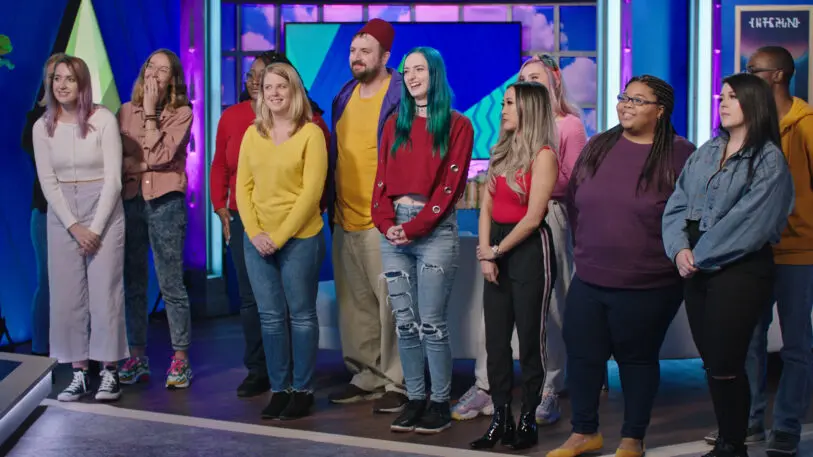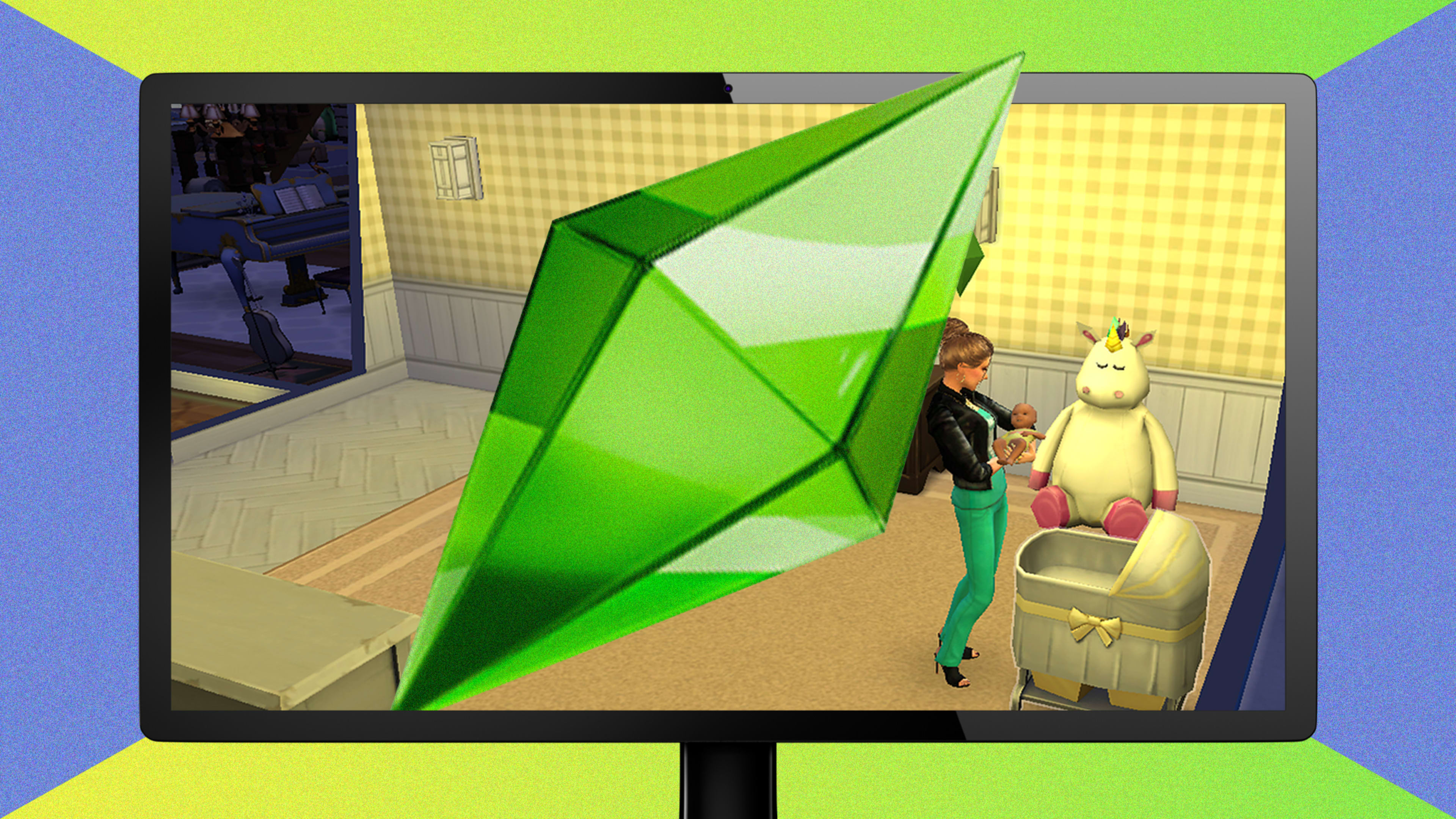What if you took a video game with an obsessively cultish following and made it the basis for a reality TV show?
That’s what Electronic Arts, the video game publishing behemoth, recently did with one of its most popular titles, The Sims, a game that first became a phenomenon over 20 years ago when it gave players the ability to build and personalize worlds and populate them with characters who act and behave much like we do.
The result was The Sims Spark’d, which debuted on TBS’s Eleague Friday night lineup and BuzzFeed‘s Multiplayer YouTube channel last month in a four-episode series. The show felt much like Lego Masters or The Great British Baking Show, complete with a host—American Idol finalist Rayvon Owen—a set of judges, and Sims fanatics and YouTube influencers (an ethnically diverse mix of mostly females) who were divvied up into groups and forced to come up with story lines and create characters and worlds under extreme time constraints and other limitations. (And, of course, get along with each other.)
The show makes the most of The Sims‘ contemporary approach to things like same-sex marriage and gender customization (you can create a Sim with any tone of voice, gait, and physique, regardless of what sex the character is), giving it an extremely relevant feel.
Spark’d was a kind of Hail Mary pass for EA, whose foray into esports has run more along the lines of taking its core video game franchises and turning them into hours-long competitions geared to entertain (and really only make sense to) players of the game. Those shows, which air on platforms like Twitch as well as Eleague, are not only lengthy, but they’re based on the sports broadcast model. Commentators analyze game play as it unfolds, and viewers get a sense of the players and their backstory, but the real drama is simply the game.
But with The Sims Spark’d, the show didn’t look to mimic a basketball or football game, but TV—more specifically, the tried-and-true format of reality TV—where every nanosecond of programming is milked for maximum emotion and conflict. It was also unique in that its primary goal wasn’t to drive interest back to the video game (though that is a happy byproduct), it was simply to entertain.
“Everybody for 20 years has been going after the same audience,” says Todd Sitrin, SVP and general manager of EA’s Competitive Gaming Entertainment team. “That’s males, hardcore video-game players who play strategy games, who play shooter games and hang out on digital channels. What we’re focused on is not just doing that but opening it up to an untapped audience. If you just look outside of the esports industry, there are so many different types of inspirations that have nothing to do with sports.”

But the show’s success is not only paving the way for another season of Spark’d. It has validated and accelerated EA’s overall approach to esports, which has become much broader in recent months. Going forward, Sitrin said that while half of the company’s gaming broadcasts will be in the more traditional vein of esports programming, a quarter will be esports games layered with a more entertainment-oriented component. For example, EA just announced that one of its biggest esports franchises, Madden NFL 21, whose latest edition launches next month, will feature a tournament series called Derwin James vs. The World, in which the NFL superstar (who also happens to be one of the world’s greatest Madden players) will face off in game play against a different celebrity, musical artist, or athlete each week.
The remaining quarter of Sitrin’s division will be dedicated to shows like The Sims Spark’d, where the main objective is to entertain an audience that goes well beyond the world of gaming. This is a major pivot from the company’s former ratio, which was 90% traditional eports programming and 10% “everything else,” Sitrin says.
He adds that all five of the titles in EA’s Competitive Gaming Entertainment division—which was recently renamed to reflect the company’s new mission—will be receiving the Hollywood treatment. That means that FIFA, Madden, Apex Legends, The Sims, and FIFA Online 4 (the brand’s Asian version) “has at least one, if not two different ways we’re trying to innovate,” he says. “It’s a pretty dramatic shift.”
Thinking outside the Xbox
The origins for The Sims Spark’d date back to last year, when Sitrin tasked his team with coming up with a competitive game around The Sims—hardly an intuitive idea, given that The Sims involves neither guns nor an athletic contest nor any other inherently competitive strand of DNA. Though it does have an obsessive following: More than 200 million copies of the game have been sold.
“It doesn’t have strong, directive game play,” Sitrin says. “Meaning, ‘Here’s a specific objective, see if you can accomplish it.’ Yet the audience playing The Sims was kind of on the side, sort of forming in small groups and making their own little challenges. I think that was an inspiration.
“Then we’d been talking at a senior level about needing to broaden the audience, needing to make it more accessible, needing to innovate. So we put two and two together and said, ‘Wait, there’s kind of a desire by the community to add more competition—or add any competition. There’s a model here to help innovate and open up a different market.”
The idea was to make a shorter-length show (compared to those grueling esports tournaments) that would be more appealing to Gen Z and millennials, as well as one that would draw in more females and members of the non-gaming world.
But when Sitrin shared the concept around EA, people “would just look at me like, ‘What are you even talking about?’ It was just rooted in the fact that things had been done for so long—for 20 years plus—in a certain way. The idea that it could be broader just hadn’t occurred to a lot of people. So we take a lot of pride in being able to reimagine what the term ‘esports’ even means.”
EA brought on reality-TV producers, including Allison Tom and Richard Hall (The Amazing Race, Ex on the Beach), and the show was filmed last December. Then COVID-19 hit. Suddenly, more people were at home, glued to their couches, looking for something to watch. Meanwhile, sports leagues were shut down, as were Hollywood productions, leaving more air time for other sorts of entertainment. And more celebrities and other talent were available for work.
Sitrin saw even more of an opportunity and ripped up his plan for his team’s fiscal year, shifting more emphasis to games infused with a strong entertainment value. “We accelerated this transformation to say, ‘Okay, we can open up this market. We can become more accessible if we broaden our distribution. So let’s leverage TV more because it’s available. Let’s leverage celebrity more because that’s available. And let’s take our games that are accessible and push even harder on that front.
“We were on a fiscal calendar that starts on April 1. We rewrote it. And the way we rewrote it was to say, Okay, we still want to do authentic esports broadcasts, because there is an audience there. But we can open it up and think about it sort of like a marketing funnel. At the very top, you have celebrity-oriented, fun entertainment. Then in the middle you have sort of a combination, a mixture of professional esports or competitive gaming players and celebrities. Then you have a more intense form of competition if people choose.”
Hence Derwin James vs. the World.
Last spring’s FIFA Stay and Play Cup, a celebrity-driven tournament (to benefit GlobalGiving’s coronavirus relief fund) that brought together 20 of the top soccer leagues across Europe, each of whom was represented by an actual player on the team. When the tournament aired over five days on ESPN last April, it had a total U.S. viewership of 3.8 million.
The question of convergence
The Sims Spark’d fit into TBS’s own shift to broaden its ELeague Friday night programming block to include shows that go beyond those aimed at hardcore gamers.
The show Super Punch, for example, is more about “the culture of gaming,” says Craig Barry, chief content officer for Turner Sports. As for Spark’d, he says, “It really fell into this opportunity where there would be a cultural gaming franchise that really fit perfectly on a linear platform on TBS. Even more importantly, unlike a lot of other IP that we partner with or play with, it needed less native digital support.
“It was kind of a made-for-TV show with a very diverse cast. It was really kind of topical and culturally relevant in the way it was produced and executed. It played well to that casual gaming fan.”
Barry says that the challenge when migrating a video game to a non-digital platform is to find that “sweet spot” in which both the serious gamer and the casual or even non-gamer are appeased. “We understand the obligation we have to the native digital space. And we understand the obligation we have to the casual gaming fan. It’s finding that balance that makes it work.”
Then the ultimate question is: “Is there conversion? Can we convert the native digital audience to a linear platform?”
The answer to that? “To some degree,” he says, though he adds that Eleague has brought 14 million viewers to TBS who had never before consumed video content on a TV platform.
Adapting to COVID-19
EA’s own dilemma at the moment is how to move forward with the next season of Spark’d in the middle of a pandemic. “One of the challenges we have is that the first season was shot in December when we could bring people together in a room,” says Sitrin. “We can’t do that right now.
“So we’re ideating on how to do a Sims competition in a COVID world where everyone is sitting at home . . . . I think you’ll see something different until we have the ability to bring people together.”
Whatever it looks like, the new series will have a bigger marketing push (last season’s was limited somewhat because the deal with Turner came together just a month before the show debuted) and will offer more branding opportunities. “Think about if you were making a female-oriented product,” Sitrin says. “You would have zero ability to reach a video-game audience through esports. Now all of a sudden there’s an interest level there because we’re opening up to a new audience. This means other people will come in and want to work with us.
“If you have eyeballs watching, people will pay for that audience.”
Recognize your brand’s excellence by applying to this year’s Brands That Matter Awards before the early-rate deadline, May 3.
